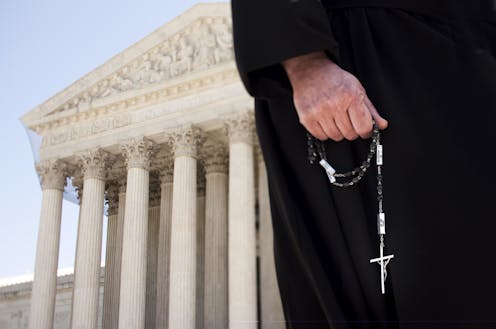The Supreme Court just expanded the 'ministerial exception' shielding religious employers from anti-bias laws
- Written by Steven K. Green, Professor of Law, Director of the Center for Religion, Law & Democracy, Willamette University

Should religious employers be allowed to discriminate?
When it comes to houses of worship selecting spiritual leaders, then the answer from lower courts has long been “yes.” Even if, say, a member of the clergy is dismissed on the grounds of their race, gender identity, age or disability. That’s because churches can claim a “ministerial exception” from complying with nondiscrimination laws.
The Supreme Court has just expanded that exemption to cover employees at religious schools. In so doing, they may have opened the doors to faith-based providers of services such as health care and social services, as well as education, to openly discriminate against staff who may perform some religious duties.
‘Unwanted ministers’
The ruling in Our Lady of Guadalupe School v. Morrissey-Berru[1] is not the first time the Supreme Court has discussed a “ministerial exception[2].”
In 2012, the justices ruled that the legal doctrine protecting religious entities from being sued[3] over discrimination – the ministerial exception – was enshrined in the Constitution, under the First Amendment’s Free Exercise Clause.
[Deep knowledge, daily. Sign up for The Conversation’s newsletter[4].]
Until then, the question over whether the government could enforce nondiscrimination laws on the selection of clergy remained open. But in an unanimous opinion, the Supreme Court ruled that places of worship can discriminate on any grounds – not just religion – when it came to their religious leaders.
“Requiring a church to accept or retain an unwanted minister,” noted the Supreme Court eight years ago[5], “interferes with the internal governance of the church, depriving the church of control over the selection of those who will personify its beliefs.”
Religious duties
This ministerial exception to nondiscrimination laws was at the heart of the Supreme Court ruling that came down July 8. The case centered around two Los Angeles areas Catholic schools that invoked the ministerial exception to justify the dismissal of two staff members.
One of the teachers alleged she had been dismissed after requesting medical leave to undertake cancer treatment. If true, such a firing would violate the Americans with Disabilities Act[6]. The second teacher alleged that she was dismissed after 20 years of service on account of her age – something that would go against age discrimination laws[7].
In neither case were the teachers’ religious beliefs or their willingness to follow the schools’ religious dictates at issue. One of the teachers was Catholic, though being a Catholic was not a requirement for teaching at either school.
The two schools responded by asserting that because the teachers engaged in some religious functions – such as providing 30 minutes of religious instruction most days – that the ministerial exception applied, relieving the schools of defending against the disability and age discrimination claims.
The Supreme Court agreed in a 7-2 opinion written by Justice Samuel Alito[8], which cited the 2012 case, which also involved a teacher[9], but one that held the title of “Minister of Religion, Commissioned,” and benefited from several tax exemptions and benefits limited to clergy.
In the latest case, neither of those factors applied to the dismissed teachers.
Nonetheless, the court ruled that because the teachers engaged in some religious activity with their students – religious instruction and engaging in worship – the ministerial exception applied.
As Justice Alito wrote, the relevant factor was their religious duties[10], not their titles, or even the bulk of their teaching responsibilities. Both teachers “performed vital religious duties” that reinforced the religious mission of the schools.
In her dissenting opinion[11], Justice Sonia Sotomayor, joined by Justice Ruth Bader Ginsburg, noted that neither teacher was considered clergy, nor did they identify as ministers or engage in a significant amount of religious duties.
She also expressed concern that the majority decision defers too greatly[12] to religious entities and allows them to effectively reclassify an employee as performing vital religious duties: “The Court’s apparent deference here threatens to make anyone whom the schools might hire ‘ministers’ unprotected from discrimination in the hiring process.”
Expanding exceptions
The case illustrates a complex legal dilemma. To ensure the free exercise of religion, religious bodies need independence to make the internal decisions that affect their faith. But an overly expansive definition of what employees may be covered by ministerial exceptions may allow the exception to swallow the rule.
References
- ^ Our Lady of Guadalupe School v. Morrissey-Berru (www.oyez.org)
- ^ ministerial exception (www.mtsu.edu)
- ^ protecting religious entities from being sued (www.nytimes.com)
- ^ Sign up for The Conversation’s newsletter (theconversation.com)
- ^ noted the Supreme Court eight years ago (www.oyez.org)
- ^ Americans with Disabilities Act (adata.org)
- ^ age discrimination laws (www.eeoc.gov)
- ^ 7-2 opinion written by Justice Samuel Alito (supreme.justia.com)
- ^ involved a teacher (www.nytimes.com)
- ^ was their religious duties (www.supremecourt.gov)
- ^ dissenting opinion (supreme.justia.com)
- ^ defers too greatly (supreme.justia.com)
Authors: Steven K. Green, Professor of Law, Director of the Center for Religion, Law & Democracy, Willamette University

